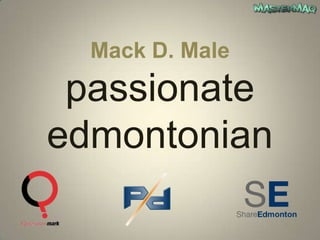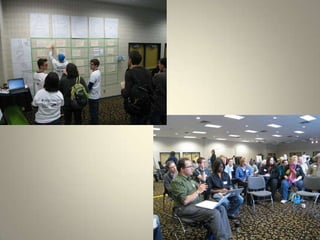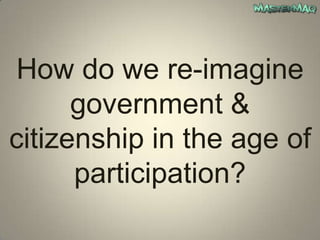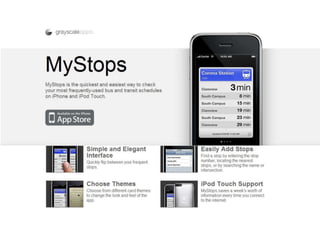Technocon 2010: Open
- 1. #technoconTechnocon 2010, Open Government & Citizens, May 5/6, 2010
- 2. Mack D. Malepassionate edmontonian
- 3. open
- 4. http://opendefinition.orga piece of knowledge is open if you are free to use, reuse, and redistribute it
- 12. How do we re-imagine government & citizenship in the age of participation?
- 17. it takes two!government& citizens
- 25. overcoming fearwhat will they do with it?
- 26. let’s be openbut for the right reasons
Editor's Notes
- All photos in this presentation are mine, unless otherwise noted. I’ve only used Creative Commons licensed photos.
- My day job: Questionmark Computing Ltd. http://www.questionmark.comMy software company: Paramagnus Developments Inc. http://www.paramagnus.comMy main project right now: ShareEdmonton http://www.shareedmonton.caMost of all, I’m a passionate Edmontonian, as you can see through my blog, tweets, photos, videos, etc.
- This is what we’re talking about. Open. Open what? Data. Government. Standards. Source. There’s a lot that’s apparently open these days!
- It’s always good to start with a definition
- The reality is that more often than not, “open” depends on your perspective. A good example of this is the recent spat between Adobe and Apple, and most notably, the letter Steve Jobs wrote on Flash: http://www.apple.com/hotnews/thoughts-on-flash/Photo: http://www.flickr.com/photos/wallace-lan/3918512147/in/set-72157621946915935
- ChangeCamp Edmonton, which took place in October, and really got the ball rolling here with regards to open data.
- The Open Data Workshop, which was held in November, continued the discussion.
- In January, the City launched it’s open data catalogue.
- In March, we had the Open City Workshop, which attempted to broaden the interest beyond just data.
- Slippery slope to go down! There are lots of things that have gotten us to the point we’re at today.In 2009, Toronto and Vancouver joined a small list of cities with open data catalogues and initiatives.Also in 2009, many Canadian cities held ChangeCamp events.In 1999, while most of us were thinking about Y2K, blogging started to become popular. I think it’s blogging that really paved the way for things like ChangeCamp. Political blogs were, and remain, one of the most popular segments of the blogosphere.In 1983, Canada’s Access to Information act came into effect. This enabled citizens to retrieve government information. We followed many other countries, such as the US which passed similar legislation in 1966 (Freedom of Information Act).
- We could keep going back in time, but we’ll arrive at the same conclusion: the discussion we’re having now isn’t new!Is it fair to trace this discussion all the way back to the Enlightenment?The Enlightenment is held to be the source of critical ideas, such as the centrality of freedom, democracy, and reason as primary values of society.
- This is the question posed by ChangeCampers across the country.More than anything else, this question gets at the heart of what open government is all about.And it’s not that different from what the great minds of the day were thinking about during the enlightenment. Thinking critically about traditional institutions, imaging and sharing a better way of doing things.
- The primary tool in the past was the book. During the 18th century, reading exploded.Photo: http://www.flickr.com/photos/stewart/461099066/
- The primary tool today, of course, is the computer. Increasingly, the computer is in your hand.University of Alberta President IndiraSamarasekera, at the EEDC Annual Luncheon, encouraged everyone in the audience to hold their mobile phones in their hands. Then she said, “in your hand, you hold the symbol of innovation.”http://blog.mastermaq.ca/2010/04/19/recap-2010-eedc-annual-luncheon/Photo: http://www.flickr.com/photos/williamhook/2830322349/
- A few other key tools that we have today are blogs, Twitter, and Facebook. They help us connect with one another digitally.We’ve seen here in Edmonton how powerful these tools can be. Twitter, in particular, was vital for ChangeCamp Edmonton and for the open data discussions (or #yegdata discussions) that came out of that event.
- Social media isn’t about technology, nor is open government. Fundamentally, they are about people, and the relationships between those people.Remember this, if nothing else!
- This is what open government, open data, and the whole open movement is all about. The relationship between government and citizens. What do we want it to look like? How do we want to maintain and cultivate it?
- All relationships need trust. How can we build (or rebuild) the trust between government and citizens? I think the two core principles here are transparency, and collaboration. There’s no need to hide anything. And by working together, we can accomplish great things.
- Fortunately, we’re not starting from scratch. We can draw on existing relationships as a model for what we want to achieve in the future.My favorite example of this comes from Edmonton’s CIO Chris Moore. He says that the City of Edmonton has been crowdsourcing for decades – just look at shoveling snow. The City doesn’t shovel everyone’s sidewalks. That would take far too much time and money. The City is transparent about that – it doesn’t just foot the bill and then try to hide it. When it snows, everyone pitches in and contributes to something bigger. We collaborate.Photo: http://www.flickr.com/photos/kenneth_hynek/4157347736/
- Let’s look at another, more recent example. Thousands of Edmontonians take the bus every day, and they rely on the route & schedule information provided by ETS to plan their trips.Until relatively recently, there were two primary ways to access this information. On paper, using the route schedule pamphlets, or online, using the custom-built ETS Trip Planner.Those methods worked well for a while, but increasingly it became clear that they alone were not sufficient.What should ETS have done? They could have been opaque and uncooperative, keeping everything to themselves and not working with others to fill the gaps.
- Instead, they embraced transparency and collaboration.They opened up the data, first by making it available as part of Google Transit. Then, at TransitCamp in May, they opened it up to all developers.
- MyStops, built using open transit data from ETS.
- And developers built applications using the data.Applications for the iPhone, for instance. The City of Edmonton isn’t in the business of software development, nor is ETS. Why not collaborate with others who are, to create something that provides value to citizens? That’s what opening up the transit data facilitated.And it’s important to note that collaboration doesn’t have to be complicated. It can be as simple as sharing the data, and linking.
- Now Edmontonians can access route & schedule information from a variety of places. Google Maps works on nearly every mobile device, with transit information. There are iPhone apps, an SMS app, and even a Twitter app!This is just one example of the good that can come from open government.Photo: http://www.flickr.com/photos/stephen_rees/2804645368/
- There’s a key stumbling block that ETS had to overcome, and that’s the fear about what would happen if they opened up the data.Would people misrepresent ETS? Could the City be held liable if something went wrong? It was uncharted territory.The reality is that the data was already open. Given enough time and resources, citizens could have acquired the data themselves. That was a key turning point.There were other challenges, but nothing that was impossible to overcome. It’s always easier to say “but” than to just do it. But that’s what we have to do!
- I think open government is a positive thing, and it’ll continue to grow and evolve here in Edmonton and elsewhere.We have to do it for the right reasons though.We have to do it because want a better relationship between government and citizens, not because being open is the hot thing to do right now.
- I think with the right amount of passion and determination, we can accomplish great things together.Let’s get started.
- Feel free to get in touch at http://www.mastermaq.ca.I’m likelymastermaq at your favorite online service



























